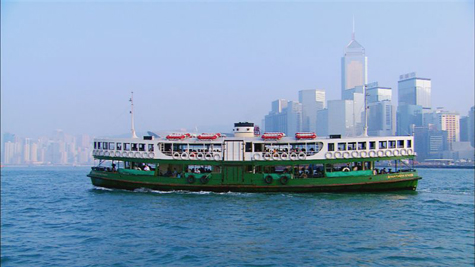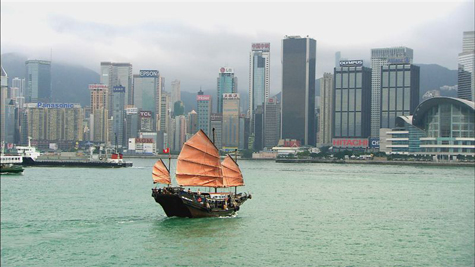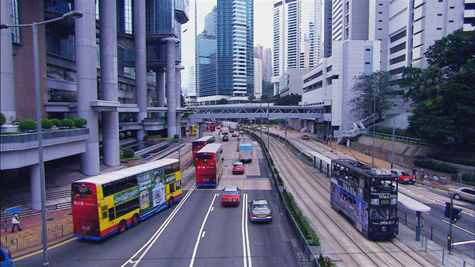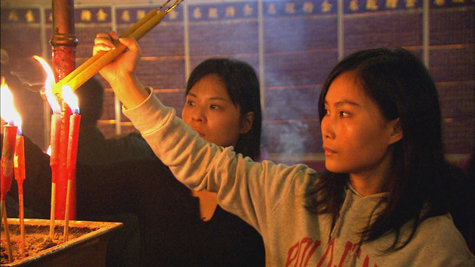In its corridors of commerce, in its seething alleys of ancient apothecaries, in its earthly rhythms and Promethean spirit, Hong Kong's uninhibited energy is clear as rice wine. But what cultural undercurrent runs through this island and its surrounding landscapes? What traditions galvanize the fierce devotion to work and family here? To what can we attribute its citizens their longevity, health, unparalleled triumphs against enormous odds, and even their seemingly paradoxical success with environmental protection?
It's not geography....there are spectacular harbors and islands, too many to count, that never spawned such a city. It's not latitude; many lesser cities share its position on the globe. As Rudyard Kipling said, "Hong Kong beats into a hamlet" other great cities of the world.

Could the answer lie in a legend as old as the land itself? My old friend, the well-known National Geographic photographer, How Man Wong, who lives in Hong Kong, told me, "To understand the heart of Hong Kong, you have to look to the dragon."
So, I went to Hong Kong, one of the most dazzling cities on earth, to explore how the vital, flowing energies of the dragon inhabit the jungles of the imagination.
Hong Kong's allure is unquestionable and unanswerable, from its cloud-busting buildings and exuberant festivals, to its serene shorelines and roar of nighttime neon. It began as a collection of quiet fishing villages, but found its voice and métier 150 years ago as a nexus for trade between East and West. After World War II, this sputtering dynamo fired and forged into the financial capital of Asia. While the population is overwhelmingly Chinese, the fusion of styles and sensibilities from around the world makes this an intoxicating cocktail of cultures. Here more intimately than anywhere else, civilizations have been thrown together. But two fundamentals stay constant yet in healthy balance: the reverence for tradition, and the fierce pursuit of prosperity.
Heralding the Chinese New Year and the coming of Spring is the mythological beast associated with power and authority, the very symbol of Chinese culture ---the dragon. Of all the animals of the Chinese zodiac, the dragon is the only mythological creature. How did this beast become fixed in the imagination of the people? How did it influence them?
"Here be Dragons," was an inscription on old European maps of the China Coast. The area was unknown, and the unknown was to be feared. In Western mythology, the dragon was a destroyer, a force of evil, a gruesome monster that represented mapmakers' apprehensions about unexplored places. But the dragon of the East has always been a benevolent creature, a genius of strength and goodness.

The Chinese zodiac consists of 12 animals, each representing a different year, and of all, the dragon is the most vital and powerful. It is auspicious to be born in the year of the dragon...dragons are free thinkers, free spirits and risk takers. They're driven, passionate and unafraid of challenges. Many couples plan their children's births for the year of the Dragon. Bruce Lee, for one, was born in the year of the Dragon.
They say when the dragon shuts his eyes it is night, when he opens them it is day. A thick cloak of fog shrouds the city as I start my day. Rain swiftly follows, a greeting, perhaps, from the dragon. An old proverb states: "When the dragon arises, the varicolored clouds follow."
In order to further understand the deep well of philosophy that informs the dragon, I visited the sacred Taoist Man Mo Temple in the heart of Hong Kong.
Among the most ancient of theologies is Taoism. The Tao is "The Way," the creative principle of the universe, the unity of all things. Taoism introduced the concept of yin and yang as two sides of a coin, opposites that come together to be complete. Taoism also posits that coursing through all living things is chi, the life force. Chi runs under the earth in gullies and streams, it runs through the veins of humans and in the pulse of the stars. Dragon breath or vapor is said to be the chi of the universe.

Many believe that deep beneath the island of Hong Kong there is an energy flow that runs from Victoria Peak all the way to the harbor, called the dragon's vein. Through it runs chi, the very essence of life. It's propitious to build near this vein but very unfavorable to block it.
The art of divining where to build, how to encourage chi to run smoothly through buildings and how not to offend dragons living in the hills, is the art of feng shui.
The concept of feng shui began about 2700 BC, when the Yellow Emperor, who was considered a living manifestation of a dragon, first discovered how to make a compass. So did the dragon, then, beget the compass? Perhaps. The earliest compasses were used by geomancers, specialists who located the spots that would bode well for a building or a village by determining the dragon lines.
Aswarm with a hive of busy boats is Victoria Harbor and a ride across it on Hong Kong's Star Ferry figures among the world's best boat rides. Across the water from Hong Kong Island, dragons inhabit the hills behind the high keeps and spires of Kowloon.

Kowloon itself means "nine dragons" in Cantonese. Its genesis is a story that dials back to 1279 AD. The Southern Sung Court, along with the boy emperor, was fleeing from the Mongols who were invading from the north. They made it to the South China Sea, and the child emperor was looking at what is now Kowloon, and he counted the hills. After his count he said to his minister, "Look, there eight dragons--eight hills on this peninsula." And the minister said, "Well, yes, your royal highness, but you have forgotten that you, as the son of the dragon, are the ninth dragon." And thereafter the peninsula was named Kowloon, for the nine dragons, including the young emperor.
Hong Kong, like the dragon, has no truck with envy, rather the city works, and works hard for wealth and the possibilities that come with it. Well-being and affluence have allowed the city to make significant and vital decisions related to environment. The prosperity and vaulting ambition of Hong Kong is now being harnessed, as the city moves to place its wealth toward green initiatives.
One of the main tenets of Taoism is wu-wei, which means to take no action that is contrary to nature. And while much of the world has certainly upset that balance, Hong Kong seeks to lead the way with a green leap forward, investing in clean technologies and restoring and preserving open spaces.

Behind the superstructures, beyond the malls, some 40% of Hong Kong is protected with public parks.
Around every bend in this brilliant, pandemonius city, an invisible force, a harmonious flow endows all things, from the rise and fall of empires to the budding of a peach blossom. This life energy, or chi, is an age old concept forever linked to the mythic, mysterious and magical dragon. The dragon exists in the hearts and the minds of the people of Hong Kong - it's their verve, entrepreneurial spirit, their dedication to family and to the folklore of collective memory.
There is an old expression here: "With money, a dragon; without money, a worm." Those in the West want to slay the dragon; in Hong Kong, they want to be the dragon.
Maybe there is something to this precept: prosperity as a means to a larger goodness, a higher virtue, a balance of growth and preservation.
Perhaps we all have untapped dragons within us, and by acknowledging and firing them up, we can make a difference.
The high-definition television special, "Hong Kong: Quest for the Dragon," (part of the on-going series, "Richard Bangs' Adventures with Purpose) is airing now on PBS stations nationally. Check your local listings for airtimes.